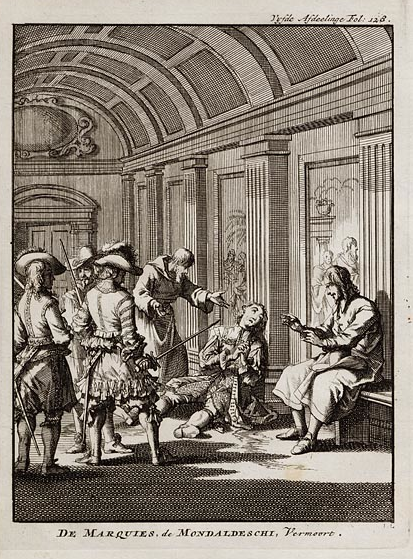On this date in 1657, the Italian marchese Gian Rinaldo Monaldeschi was put to summary death by the command of Queen Christina of Sweden, at her court in Fontainebleau.
Make that ex-Queen, for the singular sovereign had abdicated in 1654 so that she could convert to Catholicism and go gallivanting about Europe.
After a spell in Rome, 1656 finds her turning up in Paris to astonish high society by her forward, masculine presentation; the king’s cousin took Christina to the ballet where the visiting dignitary “surprised me very much — applauding the parts which pleased her, taking God to witness, throwing herself back in her chair, crossing her legs, resting them on the arms of her chair, and assuming other postures, such as I had never seen taken but by Travelin and Jodelet, two famous buffoons … She was in all respects a most extraordinary creature.”
She kept her own court here, which was both a tribute to her stature and a court in waiting for her intended installation by French arms upon the Neapolitan throne. This rethronement never came to pass, and one reason among several was that the event marked in this post destroyed her stature in Italy.
Our man the Marquis Monaldeschi was Christina’s master of horse but to the eyes of the queen better resembled a snake. Why? That part, we don’t quite know.
The details of Monaldeschi’s treason are tangled and obscure. One knows that he confessed; but one does not know what he confessed. One knows that he forged letters; but one does not know what was in the letters. One knows that he tried to throw the blame for his own misconduct on Francesco Santinelli; but the precise nature of that misconduct is wrapped in mystery, as are also the precise grounds of Santinelli’s quarrel with him. All that is clear is that neither of the two men merits much sympathy, and that the proceedings of both of them were tortuous …
[Seeking to implicate his rival Santinelli in some malfeasance, Monaldeschi] tried to make out too good a case by forging Santinelli’s handwriting, and offering the letters as proofs that Santinelli was a “traitor.” … What first led her to suspect Monaldeschi is uncertain. In any case, “information received” induced her to intercept and open his letters; and their contents seemed to her to furnish full proofs of his perfidy. The nature of that perfidy is not disclosed in her own account. (Source)
What is not obscure, for it shocked all of Europe, is the punishment she visited for said perfidy — for Christina gave it over to that very Francesco Santinelli, Monaldeschi’s greatest rival in the court whom he had intended to stitch up, to deliver the penalty on the spot and with his own hand. She had the entire right to pronounce such a sentence in her court, but the Game of Thrones-like barbarism of being summarily put to an adversary’s blade right on the palace stones was widely abhorred. When she returned to Rome the following year, the French were quite done with her and the Italians who would be her grudging hosts for most of her remaining years nowise pleased to welcome her.
On this day..
- 1066: John Scotus, sacrificed to Radegast
- 1945: The Rüsselsheim Massacre perpetrators
- 1735: Elizabeth Armstrong, oyster knifer
- 1882: Samuel and Milton Hodge
- 1944: Thirteen from the Ehrenfeld Group and the Edelweiss Pirates
- 1939: Nelson Charles
- 1571: Anneken Hendriks, cursed Mennonist
- 2009: John Muhammad, D.C. sniper
- 1834: The bushrangers John Jenkins and Thomas Tattersdale
- 1865: Henry Wirz, for detainee abuse
- 1780: Corregidor Antonio de Arriaga, by his slave
- 1954: Hossein Fatemi, before the blowback
- 1995: Ken Saro-Wiwa and the Ogoni Nine

